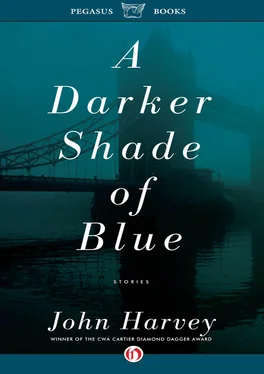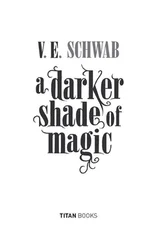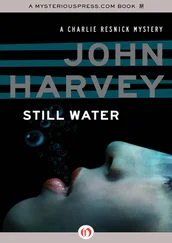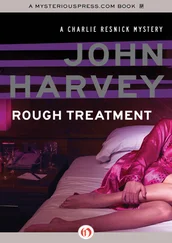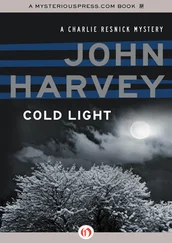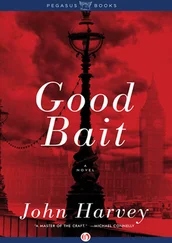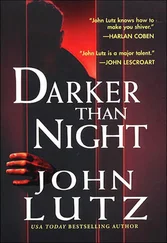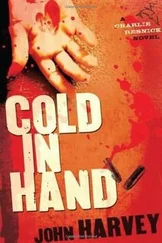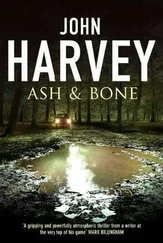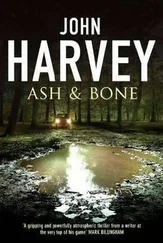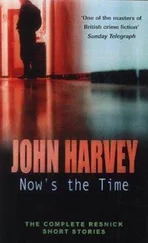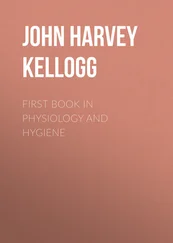John Harvey - A Darker Shade of Blue
Здесь есть возможность читать онлайн «John Harvey - A Darker Shade of Blue» весь текст электронной книги совершенно бесплатно (целиком полную версию без сокращений). В некоторых случаях можно слушать аудио, скачать через торрент в формате fb2 и присутствует краткое содержание. Жанр: Полицейский детектив, на английском языке. Описание произведения, (предисловие) а так же отзывы посетителей доступны на портале библиотеки ЛибКат.
- Название:A Darker Shade of Blue
- Автор:
- Жанр:
- Год:неизвестен
- ISBN:нет данных
- Рейтинг книги:4 / 5. Голосов: 1
-
Избранное:Добавить в избранное
- Отзывы:
-
Ваша оценка:
- 80
- 1
- 2
- 3
- 4
- 5
A Darker Shade of Blue: краткое содержание, описание и аннотация
Предлагаем к чтению аннотацию, описание, краткое содержание или предисловие (зависит от того, что написал сам автор книги «A Darker Shade of Blue»). Если вы не нашли необходимую информацию о книге — напишите в комментариях, мы постараемся отыскать её.
A Darker Shade of Blue — читать онлайн бесплатно полную книгу (весь текст) целиком
Ниже представлен текст книги, разбитый по страницам. Система сохранения места последней прочитанной страницы, позволяет с удобством читать онлайн бесплатно книгу «A Darker Shade of Blue», без необходимости каждый раз заново искать на чём Вы остановились. Поставьте закладку, и сможете в любой момент перейти на страницу, на которой закончили чтение.
Интервал:
Закладка:
At Wimbledon, Kiley found himself sharing overpriced strawberries and champagne with Adrian Costain, a sports agent he’d brushed up against a few times in his soccer days, and when Costain rang him a week later with the offer of some private work, he thought, why not?
So here he was, ten years down the line from his twenty-five minutes of fame, a private investigator with an office, a computer, pager, fax and phone; a small but growing clientele, a backlog of successfully resolved, mostly sports-associated cases.
Jack Kiley, whatever happened to him?
Well, now you know.
Kiley was alone in his office, August third. Two rooms above a bookshop in Belsize Park. A bathroom he shared with the financial consultant whose office was on the upper floor.
‘So what d’you think?’ Kate had asked him the first time they’d looked round. ‘Perfect, no?’ Kate having been tipped off by her friend, Lauren, who managed the shop below.
‘Perfect, maybe. But rents in this part of London… There’s no way I could afford it.’
‘Jack!’
‘It’s all I can do to keep up with the payments on the flat.’
‘Then let it go.’
‘What?’
‘The flat, let it go.’
Kiley had stared around. ‘And live here?’
‘No, fool. Move in with me.’
So now Kiley’s name was there in neat lettering, upper and lower case, on the glass of the outer door. The office chair behind the glass-topped desk was angled round, suggesting his secretary had just popped out and would be back. As she might, were she to exist. In her stead, there was Irena, a young Romanian who waited on tables across the street, and two mornings a week did Kiley’s filing for him, a little basic word processing, talked to him of the squares and avenues of Bucharest, excursions to the Black Sea, of storks that nested by the sides of country roads.
In Kiley’s inner sanctum were a smaller desk, oak-faced, an easy chair, a couch on which he sometimes napped, a radio, a TV whose screen he could span with one outstretched hand. There was a plant, jasmine, tiny white flowers amongst a plethora of glossed green leaves; a barely troubled bottle of single malt; a framed print Kate had presented him with when he moved in: two broad bands of cream resting across a field of mottled grey, the lines between hand-drawn and slightly wavering.
‘It’ll grow on you,’ she’d said.
He was still waiting.
The phone chirruped and he lifted it to his ear.
‘Busy, Jack?’ Costain’s voice was two-thirds marketing, one-third market stall.
‘That depends.’
‘Victoria Clarke.’
‘What about her?’
‘Get yourself down to Queen’s. Forty-five minutes to an hour from now, she should be towelling down.’
Kiley was enough of a Londoner to know car owning for a mug’s game. Within three minutes, he’d picked up a cab travelling south down Haverstock Hill and they’d set off on the zigzag course that would shuttle them west, Kiley wondering how many billboards of Victoria Clarke they would pass on the way.
That damp June and July she had been a minor sensation at the Wimbledon Championships, the first British woman to reach the semi-finals since Boadicea, or so it seemed, and ranked currently twenty-three in the world. And she had sprung from nowhere, or somewhere near the Essex end of the Central line at best; a council flat she had shared growing up with her sister, stepdad and mum. And like the Williams sisters, Serena and Venus, in the States, she had learned to play on public courts, enjoying none of the privilege that usually attended the luckless Amandas and Betinas of the English tennis world. Nor did it end there. Her face, which freckled slightly in the sun, was beautiful in a Kate Moss kind of a way, her legs slender and long; the quality of the sports photographer’s long lens and of television video ensured that not one salted bead of sweat that languished on her neck then slowly disappeared into the decolletage of the thin cotton tops she liked to wear was spared from public view.
Before the tournament was over, Costain had the contracts signed, the company’s ad campaign agreed. Less than a fortnight later, the first of the advertisements appeared: Clarke crouching on the baseline, racket in hand, lips slightly parted, waiting to receive. In another she is watching the high toss of the ball, back arched, about to serve, white cotton top stretched tight across her breasts. For these and others, the strapline is the same: ‘A Little Honest Sweat!’ Just that and a discreet Union Jack, the deodorant pictured lower right, close by the product’s name.
Unreconstructed feminists protested and sprayed slogans late at night; students tore them down as trophies for their rooms; Kate devoted her column in the Independent to the insistent eroticising of the everyday. One giant billboard near an intersection on the Al north was removed after advice from the Department of Transport.
In the Observer Sport Monthly’s annual list of ‘Britain’s Top 20 Sportswomen’, Victoria Clarke was number seven with a bullet, the only tennis player to appear at all.
‘Forgot your racket,’ the cabbie joked, glancing at Kiley, empty-handed, waiting outside Queen’s Club for his change and his receipt.
Kiley half-grinned and shook his head. ‘Different game.’
Costain was in the bar: tousled hair, rimless glasses, Paul Smith suit and large gin. He bought Kiley a small Scotch and water and they moved to a pair of low leather chairs by the far wall. Good living, Kiley noticed, had brought Costain the beginnings of a belly the loose cut of his suit just failed to disguise.
‘So how is it really?’ Costain asked with a smile.
‘You know.’
‘Still with Kate?’
Kiley nodded.
‘How long’s that now?’ And then, quickly, ‘I know, I know, who’s counting?’
In a week’s time it would be two years since they’d started seeing one another; nine months, almost to the day, since he’d moved into Kate’s house in Highbury Fields. Kate, Kiley knew, had gone out with Costain a few times some few years back; kissing him, she said, was like being force-fed marinated eel.
‘Victoria Clarke,’ Kiley said, ‘what’s the problem? There is a problem, I suppose.’
Costain drank a little more gin. ‘She’s being blackmailed.’
‘Don’t tell me she was a Page Three Girl for the Sun.’
For an answer, Costain took an envelope from the inside pocket of his suit coat and passed it across. Inside, a black-and-white copy of a photograph had been pasted to a single sheet of paper: a young woman in a park, holding a small girl, a toddler, high above her head; in the background, another woman, beside an empty buggy, looks on. The first woman, and the girl, are smiling, more than smiling, laughing; the second woman is not. The quality of the copy was such, it took a keen eye to identify the former as Victoria Clarke. Even then, there was room for doubt.
‘Is this all there is?’ Kiley asked.
‘It arrived this morning, first post. A phone call some forty minutes later, man’s voice, disguised.’ He nodded towards the paper in Kiley’s hand. I imagine the original’s a lot clearer, wouldn’t you?’
‘And the child?’
‘Hers. Victoria’s.’
Kiley looked at the picture again; the relationship between the two women was there, but it wasn’t yet defined. ‘Whoever sent this, what do they want?’
‘A quarter of a million.’
‘For what?’
‘The negative, all originals, copies. We’ve got two days before they sell it to the highest bidder. The tabloids’d go ape shit.’
Kiley tasted his Scotch. ‘Why now?’ he asked.
‘We’re in the middle of renegotiating Victoria’s advertising contract. Very hush-hush. Big, big money involved. If nothing slips out of sync, everything should be finalised by the end of the week.’
Читать дальшеИнтервал:
Закладка:
Похожие книги на «A Darker Shade of Blue»
Представляем Вашему вниманию похожие книги на «A Darker Shade of Blue» списком для выбора. Мы отобрали схожую по названию и смыслу литературу в надежде предоставить читателям больше вариантов отыскать новые, интересные, ещё непрочитанные произведения.
Обсуждение, отзывы о книге «A Darker Shade of Blue» и просто собственные мнения читателей. Оставьте ваши комментарии, напишите, что Вы думаете о произведении, его смысле или главных героях. Укажите что конкретно понравилось, а что нет, и почему Вы так считаете.
